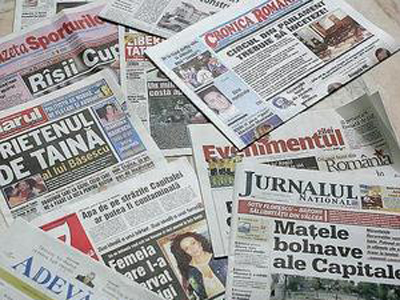
Media freedom remains elusive and yet necessary in the post-communist sphere. The European Union, in particular, struggles to find the middle ground between intervention, controlling the media, and supporting full decommunization. Indeed, recent events in Romania, Hungary, Poland, and the Czech Republic exemplify Brussels’ indecision.
On 4 February 2013, Jose Manuel Barroso warned that media campaigns threaten Romanian judicial institutions. In a statement, Barroso noted, “we cannot dismiss the fact that we have received complaints by the Constitutional Court, by the Superior Council of Magistracy, about campaigns orchestrated in the media against the independence of the magistrates, either prosecutors or judges.” Similar concerns were raised earlier in a commission report on Romania’s rule of law published on 30 January. The paper further stated that the Romanian government must “review existing standards to safeguard a free and pluralist media while ensuring effective redress…against undue pressure or intimidation from the media against the judiciary.” This report raises some extremely controversial points concerning the level of involvement of the EU. On a domestic level, Romania’s recent political situation depended on the judiciary. Yet the continuous lack of transparency in the decision-making process within the judicial branch led to harsh criticism as well as internal debate among magistrates.
The lack of transparency highlights real problems within the Romanian judicial system, and subsequently contradicts many aspects of the Commission’s report. Given the facts, Brussels’ position is baffling and in fact, the conclusions have the potential to worsen the situation. Romanian authorities and media leaders, for example, might mistake the commission’s report as permission to silence criticisms against the presidency or government.
Yet more than an overly critical media, the main issue remains the level of political clientelism and corruption within the media sector. There are often a notable number of state actors in the media sector and many members of the National Audiovisual Council are political appointees. Taking these facts into consideration, Diana Olivia Hatneanu, from the Romanian Helsinki Committee observed, “The wording of the EU rule of law report is too vague and leaves room for authorities to take measures against independent media.”
The Romanian case, however, is only one example of the EU’s questionable media interventions. Hungary, for instance, also experienced similar contradictory attitudes from Brussels. In May 2012, The EU condemned Hungary for new media laws, which politicized media regulations and imposed balanced reporting requirements, by obliging online and print media to register with authorities. Yet more than this, the Hungarian prime minister directly appoints the president of the Media Council and the council itself remains firmly entrenched in the state. Furthermore, the nine-year tenure of its members can only be ended by a supermajority of parliament. These actions forced Brussels to pressure Hungary with article seven, which suspends the voting rights of member states. Nonetheless, these threats are the only clear action taken by Brussels concerning the status of independent media; in the cases of The Czech Republic, Bulgaria, and Hungary, the EU remained silent.
In 2011, military police in The Czech Republic stormed Czech Television offices. Previously, according to the online publication Aktualne, military police visited the station the day before and seized copies of a leaked 2007 military intelligence document that spoke of alleged corruption in the Defense Ministry. Once again, the same common themes are present: the concern of political clientelism and the subsequent use of media as mouthpieces to further agendas, repression of media laws complemented by a lack of a strong judicial system to guarantee the freedom to report, and finally, the recurrent politicization of the Media Council. Moreover, this event came on the heels of a 2009 incident in the Czech Republic, in which a journalist was fined for reporting on a meeting between a lobbyist and a member of the president’s staff.
Problems were also highlighted in Poland and Bulgaria. Three journalists, for example, were subjected to a rare case of criminal-libel charges, one of which received a suspended prison sentence. The verdict stemmed from two February 2001 articles alleging that the speaker of the promotion and information unit of the Police City Council obtained his post through blackmail and used the position to promote his private advertising business. In Bulgaria, the government fined a weekly publication for printing a reader’s letter accusing a politician of corruption. These events, both large and small, demonstrate the overall decay of media freedom in Eastern Europe. Further criticisms from the EU, in this context, will only worsen the situation of an already feeble independent media in the region.
Conclusions
Brussels must ask itself if the media is sufficiently ‘decommunized’ or conversely, can these states have a liberal system with an illiberal media? Instead, however, the EU’s commissioned report on Romania – which criticizes the media for being overly harsh – shows little understanding of the contemporary domestic situation.
In 2012 Barroso stated, “The freedom of media is for us a sacred principle. It’s a problem of value, there can be no doubt about it.” While the EU did demonstrate a stronger position in Hungary, overall Brussels still lacks clarity. The EU must first find common ground between a strong local media sector and a comprehensive understanding of the domestic situation. Secondly, members of European Parliament must be persuaded to limit political influence in local media outlets.
A flawed intervention caused by a lack of understanding could lead people to perceive the EU as an overly controlling organism of society – a reputation that will not help the EU’s already crumbling credibility.
Opinions voiced by Global Minds do not necessarily reflect the opinions of The Global Journal.
(Photo © DR)




Comments
You need to be logged in to add comments. Login